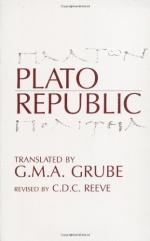|
This section contains 2,412 words (approx. 9 pages at 300 words per page) |

|
The Evolving Role of Poetry and the Poet
Summary: Describes ancient Greek philosophers Plato's and Aristotle's views on poetry and the poet. Explores each philosopher's opinion on diction, mechanics, plot and character structure, and imitation.
"The safest general characterization of the European philosophical tradition is that it consists of a series of footnotes to Plato," claimed Alfred North Whitehead in 1929's Process and Reality. Plato studied under Socrates in Athens, Greece, and showed a deep interest for politics. It wasn't until Socrates death that Plato turned from politics to philosophy. He developed Idealism in opposition to the belief of the Sophists and opened a school in Athens. The Academy was one of the first organized schools in Western Civilization it was here that Plato taught his most famous student, Aristotle. Plato's most famous work is The Republic. In it Plato describes a perfect, or ideal, state. The beginning of the work investigates the true meaning of justice. Towards the middle of the work Plato begins leading into philosophy, and Book X discusses the purpose of art in his ideal state, specifically poetry. Ion...
|
This section contains 2,412 words (approx. 9 pages at 300 words per page) |

|


